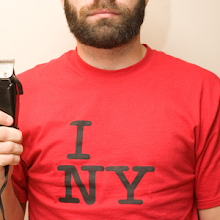
I was just reading Alec Wilkinson's story in the New Yorker about Gordon Bell's quest to archive his life. For more than three years Bell has been saving recordings of his voicemails, phone calls, computer and web usage as well as wearing a SenseCam and having a, "pleasant, determined, and resourceful woman," scan all of his documents and apparently anything else (t-shirts, coffee mugs, posters).
As both a confirmed pack rat and technology enthusiast, I was very much interested in someone else who felt compelled to collect, filter and sort their lives. Strangely, I am not a journal-keeper, nor could I ever manage too stay current with my sketchbook in college. I'm almost positive there is still a box in my parents' attic that contains a green vinyl-covered scrap book with a brochure and two or three post cards from Wallace Falls from a hike my uncle took me on. My mother piles things around the house and I am my mother's son.
When I saw that Gordon was going paperless (or t-shirtless, if you will) I was excited to see how the collateral of his life would be organized. Chronologically would make sense, but if it's digital it could be alphabetical or by color, every May 24th in a pile or maybe all of the times he had felt embarrassed. Alas, it doesn't seem like they've gotten there just yet.
Wilkinson's article talks about what it is like to live every day as a recording and Bell's valid concern that recording life can get in the way of living life, which is fantastic. As it is in modern society we have emails, voice mails and snail mail chasing us at home and work, but actively cataloging could prove to be a very real hindrance to experiencing life. Will it be worth it? Can there be value in having the "perfect" memory rather than our biased, ever-changing versions of our experiences? What do we stand to gain?
After name-dropping visionary Vanevar Bush (bonus points for anyone less nerdy than me who can tell me who he is, I actually know) and putting a sinister twist on Bell's archive (by revealing that Bell is now doing this as a researcher for Microsoft, which will determine the best way to exploit the project for profit) I was waiting for the most important part of any exercise in gathering data: how to make use of all of it (search, filter, pattern recognition, this is my last parenthetical note, I swear). Sadly, this never came.
As a fairly prolific but not professional photographer, I don't have time to do more than drop my photos in folders by where or when they were shot, let alone tag them with any form of meta data. In the modern world this is incredibly important. As the pace of information flow in our lives grows, we spend an increasing amount of time marking up and filing information. Imagine you had to key word every phone conversation with your brother, each photo or pair of socks: running, muddy, Nike, New York, summer, cotton. To me that sounds like the nightmare vision of the wave of technology creating and crashing over our daily lives. I wish Wilkinson had explored this more and I hope that Bell and his team at Microsoft realize that while acquiring all of this information will be difficult, without the ability to mark up and filter in real time, there will be no value in knowing what I did at 8:53 pm on May 24, 1987.


No comments:
Post a Comment